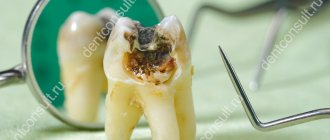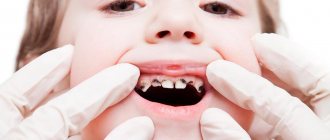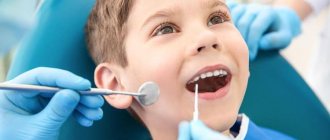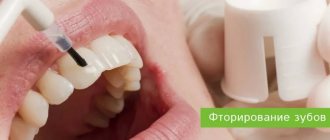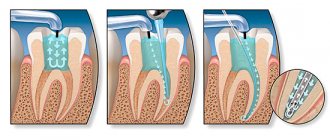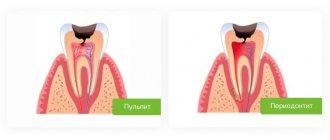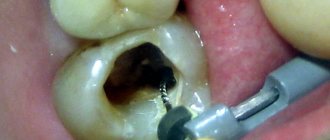Long gone are the days when everyone took calcium gluconate for strong teeth. Science moves forward, new chemical compounds are discovered, experiments are carried out with already familiar ones - in general, new interesting and useful information constantly appears. Including information about vitamins and minerals that have a positive effect on dental health.
Buying good vitamins in Moscow is not a problem now, however, this does not reduce the number of questions. For example, is it better to prefer single drugs or complex ones, how to take them - before or after meals; Which vitamins should an adult buy, and which ones are suitable for very young children?
All these questions will be answered by doctors and practicing dentists at one of the leading clinics in the capital.
What vitamins and minerals are missing if you have bad teeth?
Most often, healthy and strong teeth are associated with calcium. What traditional medicine does not recommend for this is powder from eggshells, from corals, and even ordinary chalk. Unfortunately, the human body is much more complex than an ordinary chemical flask. Regular consumption of ground organic calcium will not always lead to a positive result.
In order to absorb the required amount of this substance, it is necessary to ensure that some other minerals and vitamins enter the body. Moreover, all of them must be either in an active form, or in such a form that our body itself can quickly convert them into such. A prerequisite is the stability of the complex in the aggressive environment of gastric acid, or, on the contrary, it should have a positive effect on the absorption of one or another substance we need.
When it comes to teeth, the presence of calcium, vitamin D3, magnesium, phosphorus and other active substances in the diet is mandatory. Despite the good reviews from adherents of “grandmother’s recipes,” it is unlikely that you will be able to limit your dental care to eggshells only.
Is it possible to get your daily requirement of vitamins and minerals from food?
The calcium content in our usual foods is quite high. With a balanced diet, there is no problem in getting the 1000 mg due to a person. Same with other essential vitamins and minerals. However, one nuance remains: does everyone adhere to a balanced diet, when the diet contains sufficient quantities of sea fish, fresh herbs, various vegetable oils, seeds and nuts?
Most often, the diet of the modern average person is poor in vitamins and minerals, so it is better to buy them. Fortunately, pharmacies have a huge selection of drugs indicating which vitamins and minerals they contain and in what quantities.
It is worth mentioning vitamin D separately. Whatever products contain it, the bulk of it is synthesized in the body under the influence of sunlight. This means, in addition to a balanced diet, we need to spend enough time outdoors on sunny days. How many working people can afford such luxury? This means that a good vitamin complex is simply a must for anyone who monitors their health, and in particular the condition of their teeth and oral cavity in general.
Vitamin C (ascorbic acid)
Ascorbic acid is the key to healthy teeth, as it improves nutrition of the mucous membrane, affects metabolism, as well as the processes of hematopoiesis and blood circulation in the capillaries and vessels of the gums. Healthy gums, in turn, nourish and “hold” teeth.
The main signs and consequences of vitamin C deficiency:
- swelling, inflammation and bleeding of the gums, which can lead to gingivitis;
- the appearance of wounds and ulcers in the oral cavity;
- dryness of the red border of the lips;
- loose gums;
- bad breath;
- frequent infectious diseases of the oral cavity;
- loosening of teeth;
- in an advanced stage – periodontitis and complete loss of all teeth.
Foods rich in vitamin C:
- parsley and dill;
- rose hip;
- citrus;
- some types of berries (sea buckthorn, strawberries, black currants, etc.);
- red pepper;
- apples, etc.
Foods high in vitamin C are the best way to prevent gum inflammation.
Microelements necessary for bones and teeth
The use of calcium preparations in dentistry is mandatory not only for prevention, but also for dental treatment. In order for this element to better penetrate bone tissue in medications and dietary supplements, it is combined with other minerals, vitamins and even Omega-3 fatty acids. Pharmacy drugs are sold under a variety of names, but to choose the best one, you need to carefully read the composition in the annotation.
Calcium
If we consider medications, then calcium and calcium are different. For example, in the instructions for using calcium gluconate injections there is not a word about teeth, which means this drug is not suitable for us. The same can be said about calcium chloride or calcium chloride, which is used in medicine for completely different purposes. Neither calcium oxide nor calcium hydroxide are also suitable for strengthening tooth enamel, since they are practically not absorbed by the body.
Modern pharmacology offers us essentially five types of compounds - gluconate, carbonate, citrate, malate and chelate molecules. The price for them is completely different - from mere pennies for calcium carbonate to impressive sums for glycinates and bisglycinates (chelates).
- Calcium gluconate is the most affordable drug, known since Soviet times. One can say something cheap and cheerful about him. To get the maximum effect, the tablet must be chewed and washed down with plenty of water.
- Calcium carbonate is a good form to absorb. Rapidly breaks down in the body, releasing free calcium.
- Calcium citrate - until recently was considered the most active form. Also releases free calcium in the lumen of the small intestine.
- Calcium malate is similar to the previous one, only in combination not with citric acid, but with malic acid.
- Calcium glycinate and bisglycinate are chelated forms or organic calcium. Even though it is a synthetic molecule, it has the best properties of natural organic calcium compounds. Firstly, it immediately penetrates cell membranes as an organic molecule (free calcium needs to undergo a number of modifications for this). Secondly, it does not affect the absorption and activity of iron ions, zinc and some medications that were previously not recommended to be taken with calcium.
For maximum effect, all calcium supplements should be taken on an empty stomach one hour before meals. This should be done in the evening, since the peak metabolism of this mineral occurs around 18:00. If the daily dose is more than 500 mg, then it is advisable to divide it into 2-3 doses - anyway, more than 500 mg at a time will not be absorbed.
Phosphorus
In order for calcium from the blood to penetrate into the teeth and bones, and to fix it there, phosphorus is needed. In good vitamins for men and women, the dose of this mineral should be about half the calcium content. In general, it is recommended to take up to 1000 mg of phosphorus per day, and approximately half of this figure should come from food.
Without phosphorus, calcium is absorbed much worse, and most importantly, it begins to be deposited in tissues other than bones and teeth, which leads to the development of various diseases.
Magnesium
The relationship between calcium and magnesium in the body is very complex. Magnesium is directly involved in the mineralization of bones and teeth, being a kind of cement that holds calcium together. At the same time, he is its antagonist - that is, he performs absolutely opposite tasks.
In order to have strong teeth, it is necessary that at least 400 mg of magnesium enter the body daily. It is better to take it separately from calcium supplements, since their competition manifests itself at the absorption stage, so one thing will be absorbed per unit of carrier molecule - either calcium or magnesium.
Fluorine and boron
Fluoride is an essential mineral in the fight against tooth decay. In teeth it is found in the form of a sparingly soluble complex that is very resistant to acids. It allows the enamel to maintain its protective properties even in an acidic environment, when carious bacteria are most active.
Boron also promotes the absorption of calcium and prevents its loss by dental and bone tissue.
For fluoride and boron, optimal daily doses have not yet been established, which exist for most vitamins and microelements, however, when buying a multivitamin complex for dental health, you need to make sure that they are included in it.
Zinc, copper, manganese
Zinc is part of the dentin of teeth. It is involved in the formation of coarse-fiber bone tissue. Its optimal daily dose is 15 mg.
Copper is very important for gum health. In combination with calcium, it is even used to treat inflammatory periodontal diseases in the acute phase. The maximum daily dose is 2 mg.
Manganese plays an important role in the synthesis of chondroitin and is found in tooth dentin. To maintain healthy teeth and bones, it is enough to take at least 2 mg of manganese per day.
Vitamin C
Vitamin C - normalizes the permeability of the vascular wall, its strength and elasticity, and also increases its resistance to infection.
The human body is unable to synthesize vitamin C, so it must be obtained from food. With a lack of vitamins B and C, a disease such as scurvy or scurvy develops. In this case, bleeding, hemorrhages in the skin, subcutaneous tissue, muscles, joints are observed, and degenerative processes develop. Collagen formation is also disrupted and bone tissue formation slows down. Hemorrhagic gingivitis, rapid-onset periodontitis, occurs directly in the oral cavity.
What vitamins should I take for dental health?
The table of vitamins contains substances that are synthesized in our body in sufficient quantities, and there are those in which a person is deficient. Especially at certain stages of life. For example, women over 50 need additional vitamin E capsules, and in winter almost everyone requires increased doses of vitamin D.
Almost the entire spectrum of vitamins is necessary for dental health, however, some of them play a leading role in calcium metabolism. And calcium, as we have already found out, is the basis of dentin and enamel.
Vitamin D3
The main driver of calcium metabolism is vitamin D.
By the name vitamin D we mean a complex of active substances. Cholecalciferol (vitamin D3) is formed in the body under the influence of sunlight, and ergocalciferol (vitamin D2) can only be obtained from food. Many people are interested in which one is better to buy – water-soluble D2 or fat-soluble D3? In fact, both of them equally contribute to the absorption of calcium by the body, so you can choose either one and take it according to the instructions.
Many doctors recommend getting tested for vitamin D before you start taking it in tablets. This makes sense, since fat-soluble vitamins can accumulate in the body and cause various diseases.
The minimum daily dose for adults and children is 400 units.
Vitamin C, ascorbic acid
Ascorbic acid takes part in the synthesis of collagen, which is part of dentin. Collagen provides tissue strength. Without it, teeth would be fragile and brittle.
If we talk about which vitamins you can drink in large doses, then ascorbic acid is one of them. The minimum daily dose of vitamin C is 60 mg, however, sometimes it is advisable to increase it to 1000 mg. Ascorbic acid does not accumulate in the body, but is immediately excreted in the urine.
Vitamin K
The trivial name vitamin K combines vitamin K1 (phylloquinone) and K2 (menaquinone). The first of them is found in some plant foods, and the second is synthesized in our intestines with the participation of fats. In pharmacies you can usually buy only phylloquinone, while scientists have found that it is less active than its counterpart.
The daily dose of vitamin K2 is approximately 80 mg. It simply needs to be taken along with calcium for the normal condition of the enamel. Menaquinone is needed to form the correct spatial lattice of an organic molecule containing calcium.
Vitamin B complex
Vitamins B1, B6, B12 and others, although not directly involved in the synthesis of dentin and enamel, help maintain normal metabolism in general.
Daily doses of B vitamins in tablets are:
- Vitamin B1 – 1.5 mg.
- Vitamin B2 – 1.7 mg.
- Vitamin B3 – 20 mg.
- Vitamin B5 – 10 mg.
- Vitamin B6 – 2 mg.
- Vitamin B12 – 6 mcg.
Calcium for children
Calcium is one of the most important minerals for a child in the first years of his life. It helps the baby grow strong and healthy. Products containing calcium are something that a child’s body cannot do without. In their absence, there is no need to talk about normal growth and health of the skeletal system. Since the formation of the skeleton and body growth occurs from the moment of conception until the end of adolescence, the importance of factors influencing these processes in childhood can hardly be overestimated. Calcium is involved in many important processes, such as:
- formation of bones, dentin and tooth enamel;
- muscle contraction;
- blood clotting.
Article on our Yandex Zen channel
Dental vitamins during pregnancy
Taking vitamins for pregnant women is a controversial issue. Doctors recommend starting to drink synthetic complexes no earlier than the second trimester.
What kind of calcium can you drink during pregnancy to promote the formation of healthy teeth in the fetus and not lose your teeth? In fact, you can take any calcium, always with vitamin D3 and K2, as well as with the other microelements listed above. The main thing to consider is the following points:
- Do not exceed dosage.
- Do not take the complex for more than 2 months in total and 2 weeks in a row.
Dentists even advise buying good vitamins even at the stage of pregnancy planning, since the formation of teeth in the fetus occurs in the first weeks. If the expectant mother has a good supply of necessary substances in her body, then the baby will not have problems with teeth.
Of course, it is better to purchase a vitamin-mineral complex as prescribed by a doctor, and not choose it based on reviews on the Internet.
Vitamin A
Vitamin A or retinol enhances the protective properties of the skin and mucous membranes. With its deficiency, yellow pigmentation and hypoplasia of the hard tissues of the teeth may appear on the teeth, if this deficiency in the vitamin is revealed during the period of their development. If a deficiency of vitamin A occurs after teething, a disease such as hyperkeratosis and proliferation of the base layer occurs.
With an excess of vitamin A, an anomaly in the development of the jaws and tongue occurs, as well as an anomaly in dentin density.
Children's vitamins for dental health
Most often, the question of vitamins arises among parents in connection with the late appearance of teeth. In fact, there are no vitamins and minerals for teeth growth. In the vast majority of cases, the age at which the first tooth appears is influenced by genetics.
In general, the composition of vitamins for children differs from that for adults, so it is better to purchase special complexes rather than divide your tablet in half, into three parts, and so on. Choose a form that will be pleasant for your child - effervescent vitamins, gummy bears and syrups, then your child will be happy to take care of his dental health!
How to speed up the teething process
This process is quite painful, which is why children constantly feel itching and sometimes pain. In order for the growth of new teeth to occur more calmly and at an accelerated pace, you need to try various methods:
- Continue to breastfeed the baby - introducing complementary foods during this period does not always bring positive results, but mother's milk can soothe and even relieve pain.
- You can try using teethers, which are recommended to be cooled before use.
- Periodically massaging the gums with a damp gauze pad will not hurt. Movements should be soft, calm, and not sharp and pressing.
- To avoid the appearance of inflammatory processes, you need to wipe the oral cavity with chamomile decoction or make applications from it.
- You can use teething gels - they are sold at the pharmacy. Gels have anesthetic properties, such as lidocaine, which reduces pain.
These remedies are good in their own way, but if teeth grow in periods, thereby increasing the duration of unpleasant sensations, they simply will not be ineffective.
Completely edentulous
This is a rare phenomenon - the complete absence of tooth buds (deciduous or permanent). In this case, teeth cannot erupt because they are simply not in the jaw bone.
Complete edentia in the picture
In medicine, cases have been described when a patient had milk teeth, but permanent teeth were completely absent. The loss of baby teeth was timely, but permanent teeth did not appear in return. At this moment, the child’s parents paid attention to the problem, and the dentist made a diagnosis.
In addition to congenital, adentia can be acquired if the child has undergone severe treatment (chemotherapy) at an early age. Due to the toxic effects of drugs, tooth buds may be damaged.
What to do?
Edentia is clearly visible on a CT image. If such a diagnosis is made, the only option is complete prosthetics. Since the case is rare, the question of when to get dentures and in what way should be decided individually.
If you do not replace missing teeth with prosthetics, the chewing process cannot be complete. Even the lack of 2-3 teeth affects digestion. Bone tissue, if the jaws do not receive enough load when chewing, undergoes resorption (resorption), and this leads to weakening and loosening of the remaining teeth, increasing the risk of periodontal disease.
Therefore, if you have any complaints about your child’s teething being too slow, you should consult a doctor. In most cases, it turns out that there is no pathology, all teeth are fine and will grow a little later. But in rare cases, prosthetics may be required, which is better to know in advance. Then you can schedule treatment on time.
Other articles:
If a child does not want to be treated by an orthodontist...
When should your child see an orthodontist?
How to help your child not be afraid of dentists
Partial edentia
Adentia is the congenital absence of tooth buds. Most often, the top two “twos” are missing. Moreover, there may be a lack of both milk and permanent teeth, or both.
Adentia is a congenital condition; it occurs due to a malfunction in the embryonic period during the formation of the main organs and systems.
It is very difficult to notice partial edentia of baby teeth: the teeth are small, they are all of a similar shape, and others take the place of the missing ones. Such adentia does not harm the chewing process in any way.
If permanent teeth are missing, this is already noticeable visually. In this case, malocclusion may develop, since the “threes” are pulled up to replace the missing “twos”, and the following teeth are also displaced.
Partial edentia - absence of upper incisors
Partial edentia - there are no upper incisors, but “threes” have taken their place
The exception is wisdom teeth, also known as “eights.” Their functions are not so important; in most people they remain impacted, and if they are lost, they are not replaced with prosthetics. Their absence does not affect the health and aesthetics of the smile.
What to do?
If there is a partial lack of permanent teeth, it is most often necessary to correct the bite and prepare a place for prosthetics. If you do not make dentures, but cover the empty space with neighboring teeth, then this will not be a complete solution to the problem - the dentition will be narrower than it should have been.
